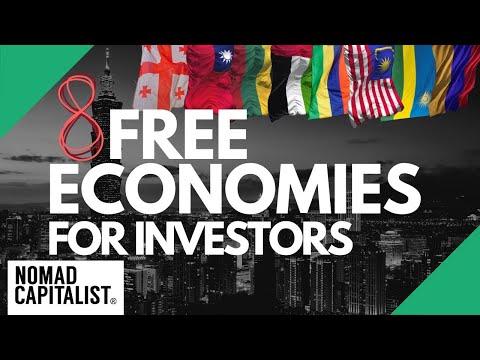The World’s Strongest Free Market Economies
May 5, 2025
Last Updated February 11, 2021
Dateline: Amsterdam, The Netherlands
Free market economies, capitalism, and the USA have traditionally gone hand-in-hand.
If you grew up inside the confines of America, you would think that it is the only place in the world where capitalism exists. These days, capitalism does exist in the Land of the Free, but as taxes and regulations increase, it is dying away.
That’s not to say that there aren’t a lot of capitalist-minded people in the US. There are many capitalists in the United States who choose to deal with the limitations, but American culture has long ceased to be capitalist.
Heck, even the Republican president is against free trade!
I was just talking to a client the other day who has a multi-million dollar business in the US and feels he isn’t wanted. Instead of thanking him for creating jobs, the government and culture are anything but welcoming.
When this is the case, many of the world’s capitalists seek out countries that value innovation, job creation, and everything else that comes with free-market economies. Fortunately, capitalism still has a chance of thriving in many other parts of the world.
So, where are the world’s strongest free market economies? Here are a few examples:
China
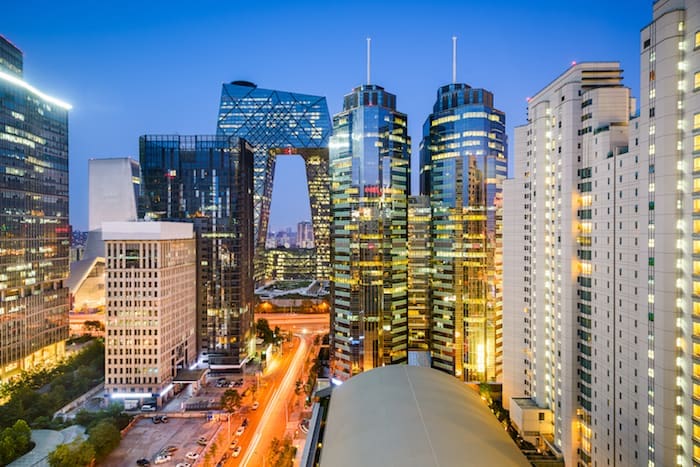
While personal freedom is not part of the equation in China, capitalism is rampant. And, for the most part, China does capitalism better than the US — in fact, better than most countries. While China is still communist, it is more “by name only” at this point.
In recent years, China has shown itself to be more recession-resistant than most countries as well. While the US government likes to claim it is “for the people” and influenced by individuals, it usually acts in its own interests. As such, very little change takes place that will actually benefit the market.
In China, the system is designed to encourage entrepreneurship. There is also a general cultural affinity toward capitalism. It is the same in places like Vietnam. Though it sounds ironic, these are the places where people work very hard and are interested in money and in starting businesses.
That naturally creates free market economies.
The government tolerates it because they recognize it’s the only way to go. Sure, tolerance is not as good as wide open arms, but it’s better than actively working against the free market culture and saying “You didn’t build that.”
Plus, the Chinese government has the ability to move more quickly as it is not tied to the comforting but useless “checks and balances” that Americans claim keep them free.
While special interests dominate the democratic government in America, China has no place for this kind of gridlock. Yes, the government in China can run roughshod over citizens, but it can also be more adaptive and reform quickly without being weighed down by corporate bribes.
Hong Kong
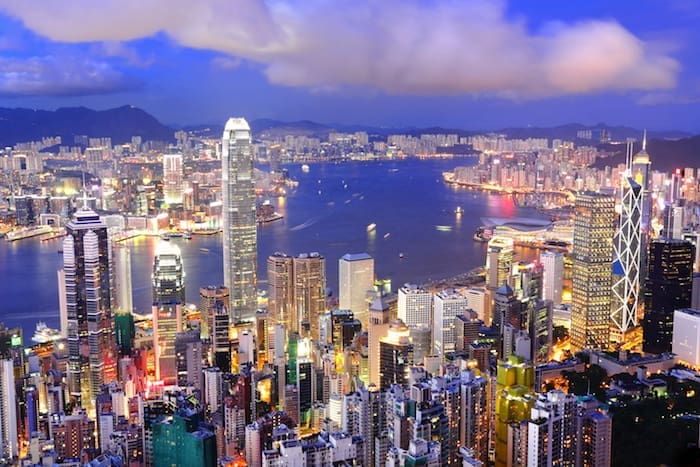
Traditionally billed as the world’s freest economy, Hong Kong remains one of the most capitalist countries and strongest free market economies. It’s almost non-existent tariffs and small government are a recipe for capitalist success.
Although it is technically a “Special Administrative Region” of China, it stands on its own as an independent free market. Hong Kong’s gross domestic product (GDP) per capita of over $40,000 is one of the highest in the world, more than four times higher than China’s.
There are signs that crony-capitalism is now creeping into the city-state. However, it still possesses a more capitalist culture, where business is the priority. In addition, it is one of the best and easiest places to open up an offshore company.
Update 2020: Despite the political and social unrest in Hong Kong this past year, Hong Kong banks and businesses continue on. One of the benefits of going where you’re treated best is that you can get all the benefits of doing business in a location without having to deal with the issues on the ground. Hong Kong is the perfect example of this.
Singapore
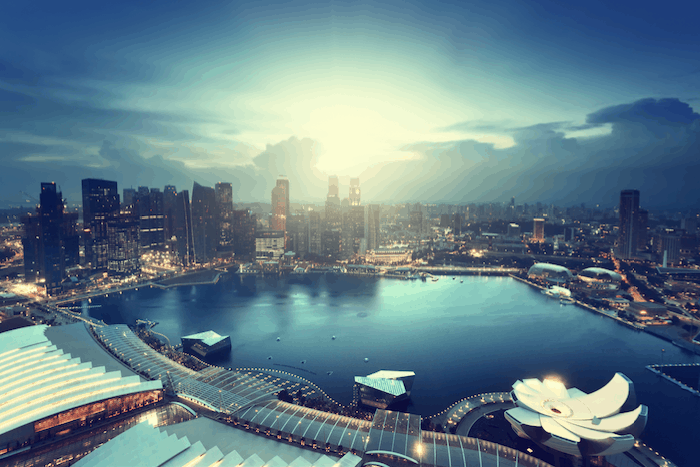
Like Hong Kong, Singapore’s capitalism is under siege with growing cronyism. However, the small island country still needs to be mentioned in a discussion of the strongest free market economies. Like China, the government is not big on personal freedom, but it is fundamentally pro-business and adaptive to changes in the market.
Singapore has also become the “Switzerland of Asia” for banking (now much better than Switzerland). The rules are much less restrictive in Singapore vs. the United States.
For example, you can transport up to S$30,000 (about US$24,000) in or out of the country without any questions being asked. (Compare this with the US’s $10,000 limit). You can also buy and sell gold and silver bullion in Singapore tax-free.
Macedonia
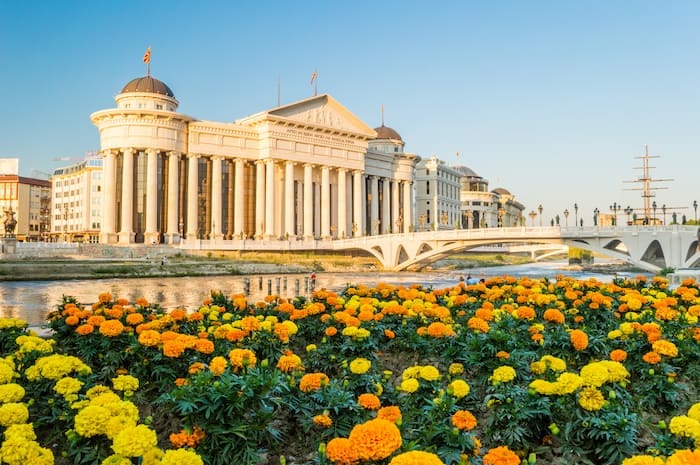
Located in the Balkans, to the south of Serbia, Macedonia has made great strides toward free-market policies in the past decade. The country is an increasingly pro-business area with 0% tax zones, free trade zones, and a 10% corporate tax. Additionally, it only takes two days to start a business in Macedonia and no minimum capital is required.
The country is working to become more transparent and to create a more flexible labor market after years of unemployment.
The Heritage Foundation notes that while property rights and corruption are still a concern in the country, there has been notable success in trade freedom, regulatory efficiency, and fiscal freedom. Because of these reforms, there is a growing entrepreneurial sector in Macedonia.
Foreign and domestic investors are treated equally and, if you’re willing to start a business and hire local workers, you can become a Macedonian citizen after just one year. The program is targeted specifically at entrepreneurs who can invest at least €400,000 for a minimum of three years.
Macedonia is one of many Eastern European countries that are embracing free-market principles as they strive for greater growth and development. The leader and trend-setter in this area is, of course, Estonia, which adopted free-market policies as soon as it was out of the grasp of communism. Capitalism has worked well for Estonia and the many countries that have followed its example.
In fact, the final country on this list is another post-Soviet government following in Estonia’s footsteps…
Georgia
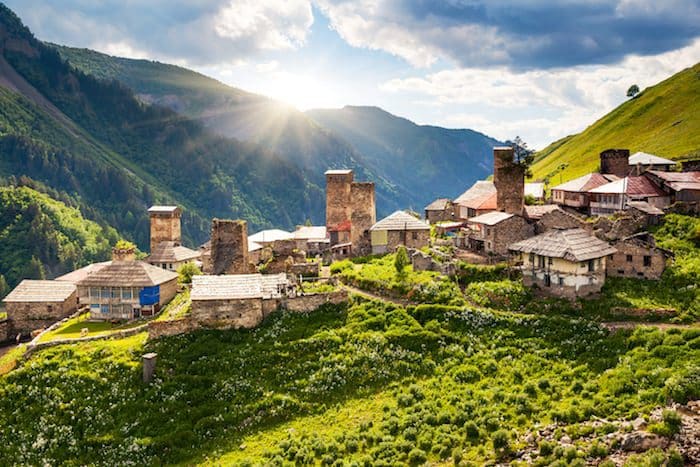
Most people think of Georgia as either a backwoods communist state in Eastern Europe or a backwoods state in the USA. The former view would be incorrect. Here’s what the previous president of Georgia had to say in 2010:
“Georgia is the world champion in economic reforms. No other country and no other government in the world has done as much as the Georgian government did to improve doing of business and for creating opportunities”
-Mikhail Saakashvili, former President of Georgia, 8 November 2010 (Georgia 2010)
Structural reforms have included privatization, competitive flat tax rates, and modernization of the regulatory environment. Of course, I’ve already written an entire article on why Georgia is one of the most capitalist countries in the world. So I’ll leave it at that for now.
These are some of the world’s strongest free-market economies. While they may not look it on paper (and shouldn’t be confused with overall levels of freedom), these are countries where capitalism is still embraced. Keep these countries in mind in your quest to keep your money and your business safe and secure.
Taiwan
For the past decade, Taiwan has developed and supported policies favorable to a free market. They have maintained reasonable government spending, kept relatively low taxation, and most favorably, they have excellent property rights. As a foreign investor, this is important for property ownership rights for your business.
Taiwan is an excellent place to start a business. The Heritage Foundation has noted that the Taiwanese government has simplified the often tedious processes for foreign direct investment.
It’s also a great place to do business on a large scale. If you’re a smaller business or just selling things on Amazon you might have better luck elsewhere, but if you’re looking to do major production and shipping on a large scale, Taiwan is an excellent place to look.
Plus, Taiwan offers a number of attractive visas for investors and entrepreneurs.
Lithuania
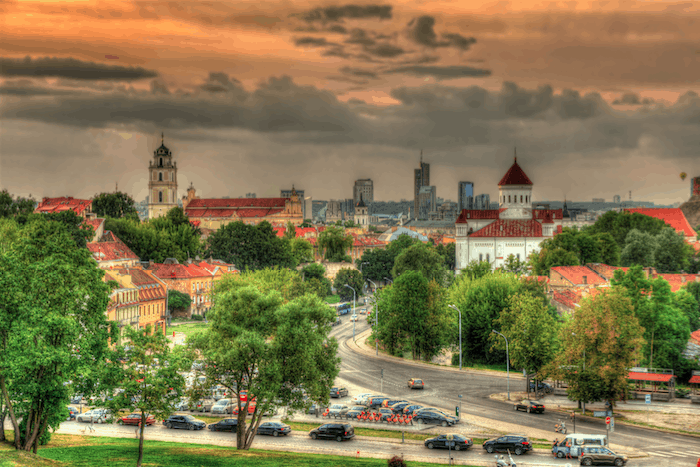
Located in the Baltics, Lithuania has recently worked to incorporate more reforms to create a free market. It’s a near neighbor to Estonia which has been more vocal and robust in their reforms. Lithuania has learned from its neighbor’s experience and is working to incorporate some of the same changes.
Lithuania is currently one of the best performers in the EU. Even though it has joined Europe in imposing (much more reasonable) social contribution taxes on employers, its income tax rates are some of the lowest in Europe at just 15%.
They have liberal trade freedom, fewer regulations, and have worked to attract more foreign investment by offering entrepreneur visas and having lower income generation requirements to keep that visa. In fact, Lithuania is a great place to start a business, especially a location independent business, and work to get residency in the European Union.
United Arab Emirates

The United Arab Emirates is probably best known as a tax haven with a very favorable tax rate of almost 0%. They did introduce a small value-added tax (VAT), but essentially no one is paying taxes there.
They have good labor freedom and, as their business sector is made mostly of foreign investment, they have created a very favorable business environment. People often worry if it’s stable, but the Heritage Foundation has marked it as having good fiscal health.
Malaysia
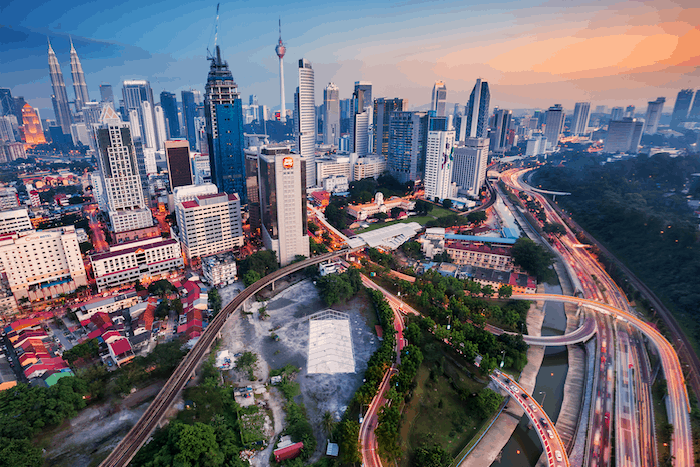
It will come as no surprise that Malaysia is on my list of the strongest free markets. There’s a good reason I chose to make this part of my Trifecta strategy. Malaysia is a great, business-friendly, affordable, and pleasant place to live as a Nomad Capitalist. They have had great economic expansion and development over the past couple decades.
The government is relatively reasonable in its regulations and the tax policies are pro-business. It’s an excellent place for larger businesses. It is also home to Labuan, a great, near-secret, tax haven.
While the Malaysian government has recently set a few restrictions on foreign land ownership requirements, property rights are still good for buying there. It’s one of the few places in Asia where you can legally own land as a foreigner, unlike the Philippines, Vietnam or Cambodia.
Rwanda

A small, but emerging country, Rwanda is the one standout on the continent of Africa. It has had a terribly sad past of civil conflicts, but is showing now that it’s ready to move on from past struggles towards a capitalist future. It has a great “Vision 2020” plan focusing on strong business growth strategies and opening to foreign investment.
Rwanda has moderate taxes, but with significant tax breaks for businesses; invest $10 million and pay zero, or produce goods for export and pay a flat 15%.
Rwanda still faces many challenges, but they have worked to keep bureaucracy minimal and make many processes easier — you can literally register a new business there within hours and anyone (literally anyone) can get a visa on arrival at Kigali Airport.
Overall, Rwanda is trying to really open up, and as someone who really likes emerging markets, I think this is a good place to look into.
Mauritius

A beautiful island located off the coast of Africa and to the east of Madagascar, Mauritius is really working to develop and diversify its markets. It has focused on a simple formula, creating favorable conditions for both local and foreign businesses and investors.
Government integrity is going up. It has really worked to clean up corruption in recent years, but the Heritage Foundation notes that this is the one area Mauritius could work on to earn a higher free market ranking.
It has low tax rates and good tax freedom. The effective rate for corporations can go as low as 3% if a company claims the available credits. It has developed a broad range of pro-business incentives and created user-friendly legislation for foreign investors.
Armenia
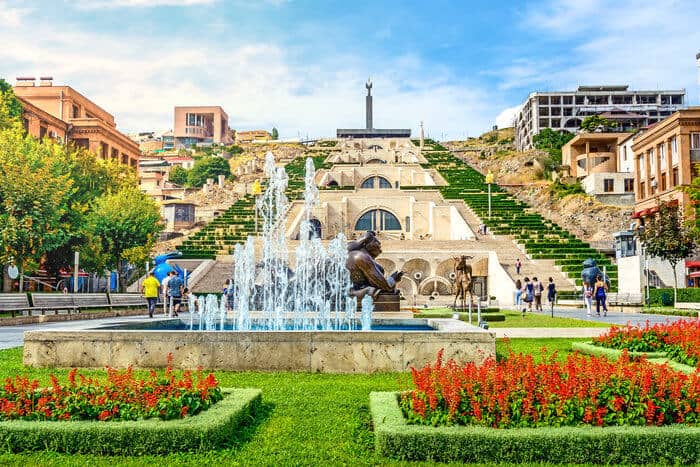
In recent years, Armenia has proven that it’s an emerging market worth looking into . Armenia’s free market rankings are up in just about everything. They have worked to reduce regulation, corruption, and taxes. They are specifically lowering corporate taxes.
Armenia’s tech scene is full of start-ups and developers. They have one of the best worth ethics I’ve ever seen. With a strong labor force, it’s a place good for micro businesses and startups.
As a southern neighbor to Georgia, a favorite of mine, Armenia has been looking to adopt similar reforms. While the neighbors haven’t gotten along well in the past, Armenia has shown more effort at becoming more friendly. They want more tourism and are making it easier to do business.
With a pro-reform government coming into place recently, many have commented to me that they can feel the difference. Within weeks of the changes, Armenia’s strong workforce responded to the changes. They are working to become more pro-western, more pro-foreigner, and more pro-investment.


Private Jet Ownership for Investors and Global Entrepreneurs
Private aviation is no longer just about luxury. For high-level investors, entrepreneurs, and global citizens, it’s an essential tool for mobility, privacy, and control. Owning a private jet goes far beyond flying in comfort. It means bypassing commercial delays, maintaining tight schedules across different jurisdictions, and gaining strategic access to offshore opportunities, second residences, and […]
Read more

Why Singapore’s Startup Hub is the Best in Asia
Once entrepreneurs hit their stride, many set their sights on relocating to a global startup hub that offers business-friendly policies, world-class infrastructure and access to international markets. Some wait until their ventures gain momentum, while others move early, incorporating as soon as a profitable idea takes shape. Enter Singapore – a sleek, future-ready city-state that’s […]
Read more

Which Country is Best for Startups in Asia?
Asia isn’t just rising – it’s redefining where and how global business gets done. With world-beating adoption, cost-effective talent and rapidly growing consumer markets, the region offers serious upside for entrepreneurs looking to start, build or scale. But with opportunity comes complexity. In fact, the region has so many options it can be daunting to […]
Read more




